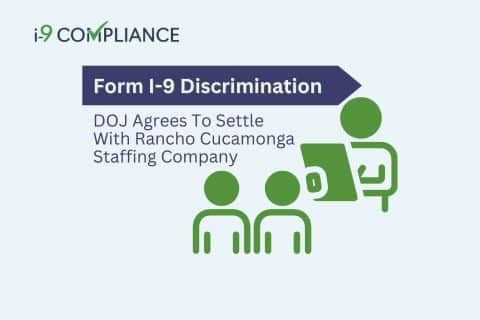DOJ Agrees To Settle With Rancho Cucamonga Staffing Company Over Alleged Form I-9 Discrimination

The Department of Justice (DOJ) has recently agreed to a settlement with a California-based staffing services provider. Based in Rancho Cucamonga, the provider allegedly violated the employment eligibility verification (Form I-9) process.
This settlement addresses the allegations that the company discriminated against a worker by denying valid proof of their lawful permission to work in the United States. It also addressed the company’s requests for other specific documentation showing future employment authorization. The lawsuit stressed that the discrimination against the worker violated the Immigration and Nationality Act (INA). As such, the DOJ began an investigation to ascertain the accuracy of these claims.
The DOJ’s Civil Rights Division’s Immigrant and Employee Rights Section (IER) concluded that the employer had unlawfully discriminated against the worker based on her immigration status. The IER stated that it rejected the worker’s Employment Authorization Document, which proved valid for another two months. Furthermore, the company allegedly told the worker to provide a new EAD before they could assign her work.
The INA prohibits employers from rejecting a worker’s lawful employment authorization documents. Furthermore, employers cannot request additional or specific documentation based on the worker’s immigration status. However, the IER’s investigations led to the following conclusion: The staffing services provider violated the INA and discriminated against the worker based on her immigration status.
According to Assistant Attorney General of the DOJ’s Civil Rights Division, Kristen Clarke, “It is unlawful for employers to require a specific document, or to reject a valid document, showing someone’s permission to work because of their immigration status. The department is committed to protecting workers from immigration-related discrimination in the hiring process and eliminating unnecessary barriers to employment.”
The settlement agreement between the DOJ and the staffing company requires the latter to pay a civil penalty of $2,200 to the government and $1,748 in back pay to the affected worker. Furthermore, the company agreed to provide its staff with training on the anti-discrimination provisions of the INA. They must also review and adjust policies as necessary and accept additional monitoring by the DOJ for an agreed-upon period.
Settlements like these illustrate the clear importance of ensuring compliance with Form I-9 and Employment Authorization Verification requirements. The best way to help ensure compliance with these requirements is to incorporate an electronic I-9 management system into the onboarding process. This system helps ensure compliance through step-by-step guidance, digital storage, and helpful reminders of when to take action to ensure continued compliance.
Learn more about automating your employment eligibility verification and ensuring compliance with I-9Compliance.